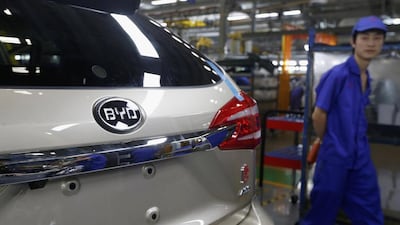China's new legislation mandating the sale of new energy vehicles (NEVs) will impact the global oil market as hydrocarbon companies defer investment on waning demand, according to analysts.
The cap-and-trade policy requires that most automakers in China sell a certain number of NEVs each year starting in 2019 as the country takes a step toward to curb carbon emissions while also bolstering its local electric vehicle (EV) industry.
"This will certainly bite into long-term demand expectations for oil," said Edward Bell, a commodities analyst at Emirates NBD.
The policy mandates that carmakers producing or importing more than 30,000 petrol-fueled vehicles a year must obtain a NEV credit score of at least 10 per cent in 2019 and 12 per cent in 2020.
As a byproduct of oil, decreasing demand for gasoline will result in more supplies on the market. China is one of the world's largest consumers of oil using 12 million barrels per day (bpd), or 13 per cent of the share of total world oil production, according to the US-based Energy Information Administration.
"For the 2020s, however, we could end up in an interesting scenario where oil prices are higher in nominal terms as oil companies defer investment because the demand profile is not as strong thanks to the encroachment of these NEVs," said Mr Bell.
_______________________
Read more:
Dubai announces new electric vehicle incentives
Tesla enters region's solar sector in another first
Business Extra podcast: The electric vehicle revolution is here
_______________________
The country's gasoline demand stands at around 3.1 million bpd, but UK-based Energy Aspects said growth is slowing. NEVs are denting demand at the margins and fuel efficiency gains are reducing consumption, resulting in demand growth hovering around 3 to 4 per cent.
Bloomberg New Energy Finance (BNEF) calculates, based on the various credits offered for different types of cars, that the actual amount of NEVs in China by 2020 will be around 5 per cent.
"It will still take time before that impacts the oil market because of the differences between new sales and vehicles already on the road," said Colin Mckerracher, BNEF clean energy analyst. However, it signals China's serious ambitions toward zero emissions.
"China is pushing very hard here and they're doing it for many different reasons. It isn't just for the environment or to reduce imports, they want their domestic automakers to push out more throughout the world," he said. "The country is the biggest auto market in world and the gov is providing a clear direction of travel for where it wants the industry to go."

